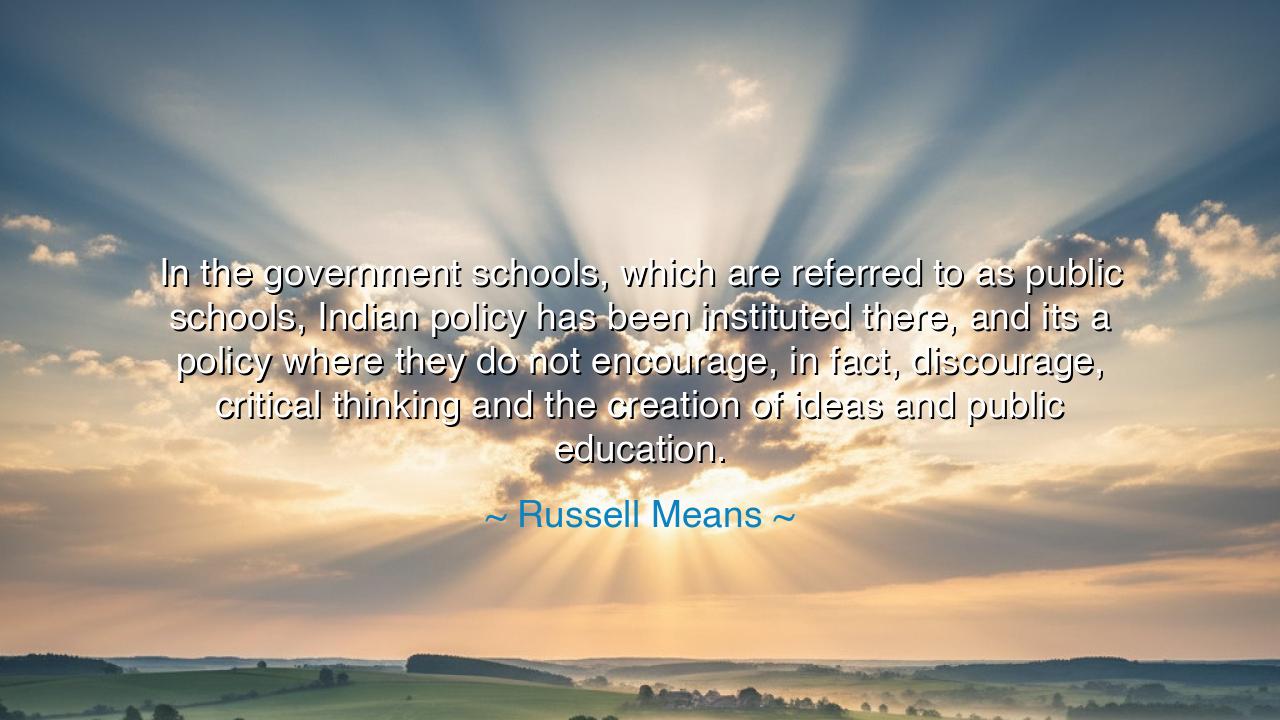
In the government schools, which are referred to as public
In the government schools, which are referred to as public schools, Indian policy has been instituted there, and its a policy where they do not encourage, in fact, discourage, critical thinking and the creation of ideas and public education.






Hearken, children of thought and seekers of truth, to the words of Russell Means, who spoke with solemn urgency: "In the government schools, which are referred to as public schools, Indian policy has been instituted there, and its a policy where they do not encourage, in fact, discourage, critical thinking and the creation of ideas and public education." In this declaration lies a profound meditation on education, freedom of thought, and the subtle chains of imposed conformity. Means reminds us that learning is not merely the transfer of knowledge, but the cultivation of the mind to question, reason, and innovate.
The origin of Means’ insight rests upon his own lived experience as a Native American, witnessing the imposition of policies designed to assimilate and control rather than liberate. Government-run schools, while labeled “public,” often became instruments of cultural suppression, shaping young minds to obey rather than to think, to follow rather than to create. Means’ words echo the ancient warning that systems of learning, if corrupted, can become instruments of oppression rather than enlightenment.
Consider the imagery he evokes: a school where critical thinking is discouraged. Education, in its highest form, is meant to sharpen intellect, awaken curiosity, and foster the creation of ideas that challenge convention. Yet when policy seeks to curtail thought, the classroom becomes a cage, the library a prison, and the student’s mind a vessel constrained by fear and conformity. Means warns that the suppression of inquiry is not merely a failing of pedagogy, but a deliberate instrument of power.
History provides a haunting parallel. The boarding schools for Native American children in the United States, from the 19th into the 20th century, aimed to erase language, culture, and identity. Children were removed from their families, forbidden to speak their native tongues, and taught to accept values alien to their heritage. Yet many, like Russell Means himself, resisted these constraints, learning not only the lessons imposed upon them, but cultivating their own critical perspective and voice in defiance of oppression.
Means’ statement also illuminates the broader principle that education is inseparable from liberty and agency. A society that discourages questioning produces obedience, not wisdom; it cultivates citizens who mimic authority rather than engage with it critically. True public education is not the repetition of doctrine, but the nurturing of intellect, creativity, and civic responsibility, ensuring that each generation can think independently and contribute meaningfully to the life of the community.
The lesson, timeless and urgent, is clear: to educate without encouraging critical thought is to train conformity, not understanding. Schools must cultivate curiosity, debate, and the courage to challenge assumptions. Means’ warning transcends his immediate context; it applies wherever power seeks to control thought through the very mechanisms that should cultivate freedom. Knowledge without freedom is hollow; guidance without inquiry is sterile.
Practical actions emerge naturally: support educational systems that promote inquiry and creativity; encourage students to question, debate, and innovate; preserve and celebrate cultural knowledge and languages; and resist policies that constrain intellectual growth or impose uniformity over exploration. By doing so, one honors the sacred purpose of education: to liberate the mind, enrich the spirit, and empower the individual and community alike.
In sum, Means’ words remind us that the true aim of schooling is not obedience, but enlightenment. Let every classroom be a forum of curiosity, every lesson a spark of inquiry, and every student a seeker of truth. By nurturing critical thought and the creation of ideas, we ensure that education remains a force for liberation, justice, and the flourishing of humanity.
If you wish, I can craft an even more epic, heroic version, turning Means’ reflection into a mythic narrative about the struggle for intellectual freedom and the power of critical thought—perfect for immersive audio storytelling. Do you want me to do that?






AAdministratorAdministrator
Welcome, honored guests. Please leave a comment, we will respond soon